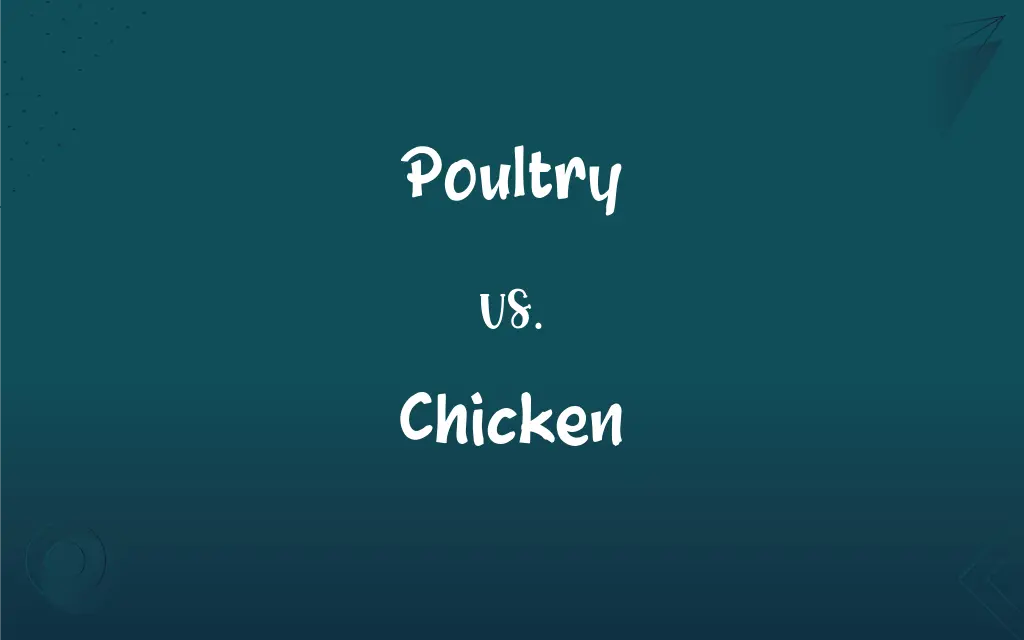Poultry vs. Chicken: What's the Difference?
Edited by Aimie Carlson || By Harlon Moss || Updated on March 4, 2024
Poultry refers to all domesticated birds kept for eggs, meat, or feathers, including chickens, ducks, and turkeys, while chicken specifically denotes a type of poultry raised primarily for its meat and eggs.

Key Differences
Poultry encompasses a wide range of domesticated birds, including chickens, ducks, turkeys, geese, and quails, that are raised for various purposes such as meat, eggs, and feathers. Chickens, on the other hand, are a specific type of poultry and are among the most widely farmed birds globally, known for their meat and eggs. This distinction highlights the broader category of poultry versus the specific bird type within it.
While poultry serves as a general term for all domesticated birds used in agriculture, chickens are specifically recognized for their contribution to human diets through their meat (broilers) and eggs (layers). Chickens have been selectively bred for these purposes, resulting in various breeds with different characteristics suitable for either egg production or meat yield.
In culinary contexts, the term "poultry" can refer to the meat of any bird considered as food, including chicken, turkey, and duck. Chicken meat, however, is distinguished by its mild flavor and versatility, making it a staple in cuisines worldwide. The culinary distinction between poultry and chicken lies in the variety of birds included under the poultry category and the specific culinary uses of chicken.
Nutritionally, both poultry and chicken provide high-quality protein, essential amino acids, vitamins, and minerals. However, the nutritional content can vary among different types of poultry based on their diets, how they are raised, and the specific part of the bird consumed. Chicken is particularly noted for its lower fat content compared to some other types of poultry, like duck.
In agricultural and economic terms, poultry farming encompasses the breeding, raising, and harvesting of various birds for meat, eggs, and feathers. Chicken farming is a significant component of the poultry industry, with specialized operations focused on either egg production or meat production, reflecting the bird's economic importance.
ADVERTISEMENT
Comparison Chart
Definition
Domesticated birds raised for eggs, meat, feathers
A type of poultry raised for meat and eggs
Types Included
Chickens, ducks, turkeys, geese, quails
Specific breeds like broilers and layers
Primary Use
Meat, eggs, feathers
Meat and eggs
Culinary Uses
Wide range of birds considered for food
Mild-flavored meat, versatile in recipes
Nutritional Content
Varies among types, generally high in protein
Typically lower in fat, high in protein
ADVERTISEMENT
Poultry and Chicken Definitions
Poultry
Broad category in agriculture.
Poultry farming is a key agricultural activity worldwide.
Chicken
Central to many cuisines.
Chicken recipes are diverse, from roasting to frying.
Poultry
Source of diverse meats.
Poultry meat varies in flavor and texture across different bird types.
Chicken
Comparison in nutritional value.
Chicken breast is known for its low fat and high protein content.
Poultry
Domesticated birds kept for products.
Poultry such as turkeys and ducks are raised for their meat and eggs.
Chicken
A type of poultry for food.
Chicken is a global staple for its meat and eggs.
Poultry
Included in dietary guidelines.
Dietary recommendations often include a variety of poultry for protein.
Chicken
Subject of selective breeding.
Selective breeding has produced chickens optimized for egg or meat production.
Poultry
Varied nutritional profiles.
The nutritional value of poultry depends on the specific bird and part consumed.
Chicken
A common domesticated fowl (Gallus domesticus) widely raised for meat and eggs and believed to be descended from the jungle fowl G. gallus.
Poultry
Domesticated fowl, such as chickens, turkeys, ducks, or geese, raised for meat or eggs.
Chicken
Any of various similar or related birds.
Poultry
Domestic fowl (e.g. chickens, ducks, turkeys, and geese) raised for food (either meat or eggs).
A poultry farmer
Chicken
The flesh of the chicken, used as food.
Poultry
The meat from a domestic fowl.
The poultry counter
Chicken
Any of various foolhardy competitions in which the participants persist in a dangerous course of action until one loses nerve and stops.
Poultry
Domestic fowls reared for the table, or for their eggs or feathers, such as cocks and hens, capons, turkeys, ducks, and geese.
Chicken
Afraid; cowardly.
Poultry
A domesticated gallinaceous bird though to be descended from the red jungle fowl
Chicken
To act in a cowardly manner; lose one's nerve
Chickened out at the last moment.
Poultry
Flesh of chickens or turkeys or ducks or geese raised for food
Chicken
(countable) A domesticated species of junglefowl (usually, Gallus gallus; sometimes, Gallus gallus domesticus or Gallus domesticus), especially so-called when young.
Chicken
(uncountable) The meat from this bird eaten as food.
Chicken
A coward.
Chicken
A young or inexperienced person.
Chicken
The game of dare.
Chicken
A confrontational game in which the participants move toward each other at high speed (usually in automobiles); the player who turns first to avoid colliding into the other is the chicken (that is, the loser).
Don't play chicken with a freight train; you're guaranteed to lose.
Chicken
A simple dance in which the movements of a chicken are imitated.
Chicken
A kilogram of cocaine.
Chicken
Plural of chick
Chicken
(informal) Cowardly.
Why do you refuse to fight? Huh, I guess you're just too chicken.
Chicken
(intransitive) To avoid a situation one is afraid of.
Chicken
A young bird or fowl, esp. a young barnyard fowl.
Chicken
The flesh of a chicken used for food
Chicken
A domestic fowl bred for flesh or eggs; believed to have been developed from the red jungle fowl
Chicken
A foolhardy competition; a dangerous activity that is continued until one competitor becomes afraid and stops
Chicken
Easily frightened
Chicken
Economic significance in farming.
Chicken farming represents a significant portion of the poultry industry.
FAQs
Can poultry meat come from birds other than chickens?
Yes, poultry meat can also come from ducks, turkeys, and other domesticated birds.
Is there a taste difference between chicken and other poultry?
Yes, the taste can vary significantly between chicken and other types of poultry, such as duck or turkey.
Why is chicken so popular in many diets?
Chicken is popular for its mild flavor, nutritional value, and versatility in cooking.
Are all chickens considered poultry?
Yes, all chickens are a subset of poultry.
Is chicken more economical to farm than other poultry?
Generally, chicken farming is considered more economical due to the high demand and efficient breeding practices.
What is poultry?
Poultry includes all domesticated birds like chickens, ducks, and turkeys, raised for meat, eggs, or feathers.
Can the term poultry be used interchangeably with chicken in cooking?
In cooking, poultry might refer to any bird meat, but chicken specifically refers to meat from chickens.
What defines chicken within poultry?
Chicken refers specifically to a type of poultry raised primarily for its meat and eggs.
How do farming practices differ between chicken and other poultry?
Farming practices can vary based on the bird, with chickens often raised in larger numbers due to high demand.
What are some ethical considerations in poultry and chicken farming?
Ethical considerations include the welfare of the birds, living conditions, and the use of antibiotics and hormones in farming practices.
What role does poultry play in global food security?
Poultry, including chicken, plays a crucial role in global food security by providing a significant source of affordable animal protein.
Can chicken and other poultry be part of a sustainable diet?
Yes, when sourced from sustainable farms, chicken and other poultry can be part of a diet that minimizes environmental impact.
How do free-range and organic poultry differ from conventionally farmed poultry?
Free-range and organic poultry are raised with access to the outdoors and without synthetic feed or chemicals, potentially offering health and welfare benefits.
What are the food safety guidelines for handling poultry?
Food safety guidelines include proper storage, avoiding cross-contamination, thorough cooking, and immediate refrigeration of leftovers to prevent foodborne illnesses.
Are the nutritional benefits of poultry and chicken the same?
While both are high in protein, the nutritional content can vary among different types of poultry.
Are there any health risks associated with consuming poultry?
Consuming undercooked poultry can pose health risks, such as salmonella infection, emphasizing the importance of proper cooking.
What are the main products obtained from poultry farming?
Poultry farming primarily produces meat, eggs, and feathers, with specific products depending on the bird type.
How do cooking methods affect the nutritional value of chicken and other poultry?
Cooking methods can significantly impact the nutritional value; for example, grilling or baking is generally healthier than frying.
Why might someone choose to eat other types of poultry over chicken?
Preferences for taste, texture, or nutritional content, as well as cultural or culinary traditions, might lead someone to choose other types of poultry over chicken.
How does the environmental impact of chicken farming compare to other types of poultry farming?
Chicken farming's environmental impact can be significant due to its scale, but it may be lower per unit than some other types of poultry farming because of efficiencies in breeding and feed.
About Author
Written by
Harlon MossHarlon is a seasoned quality moderator and accomplished content writer for Difference Wiki. An alumnus of the prestigious University of California, he earned his degree in Computer Science. Leveraging his academic background, Harlon brings a meticulous and informed perspective to his work, ensuring content accuracy and excellence.
Edited by
Aimie CarlsonAimie Carlson, holding a master's degree in English literature, is a fervent English language enthusiast. She lends her writing talents to Difference Wiki, a prominent website that specializes in comparisons, offering readers insightful analyses that both captivate and inform.
































































